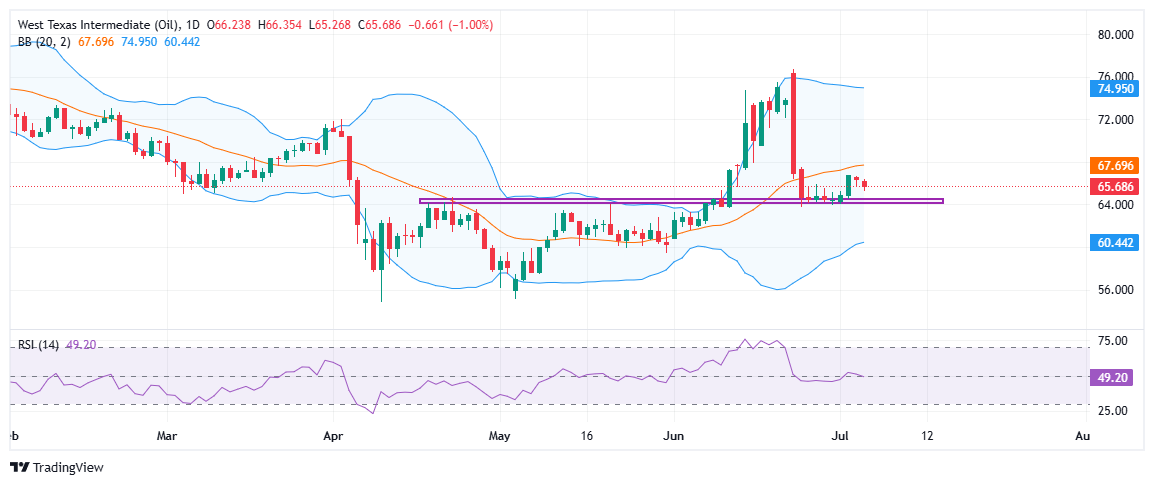WTI Crude Oil consolidates near key support, OPEC+ decision looms
- WTI Crude Oil remains under pressure near mid-$65s amid thin holiday trading and a lack of fresh catalysts.
- Traders remain cautious ahead of the July 5 OPEC+ meeting and the July 9 deadline for potential US tariff action.
- OPEC+ is expected to approve a third consecutive supply increase for August, though actual output remains below target.
West Texas Intermediate (WTI) Crude Oil prices remain subdued on Friday, extending losses from the previous day and hovering near the mid-$65s amid thin holiday trading, lingering demand concerns, and a lack of fresh catalysts. The US benchmark is trading within Wednesday’s range, reflecting a wait-and-see approach by traders.
Broader market sentiment remains cautious ahead of two key risk events, the Organization of the Petroleum Exporting Countries (OPEC+) meeting on July 5 and the upcoming July 9 deadline for potential US tariffs.
Oil traders are closely watching the upcoming OPEC+ decision, with the group widely expected to approve a third straight production increase of 411,000 barrels per day for August. While the move aims to stabilize the market and meet summer demand, actual output remains below target as several members struggle to ramp up supply. Meanwhile, geopolitical tensions have eased following the ceasefire between Iran-Israel and Iran’s renewed commitment to the Nuclear Non-Proliferation Treaty.
While supply-side developments remain in focus, the broader sentiment is dampened by soft demand signals as recent data revealed a surprise build in US Crude inventories and softer gasoline consumption despite the peak summer driving season. The Energy Information Administration (EIA) reported a 3.8 million barrel increase in stockpiles last week, while gasoline demand dropped sharply, suggesting weakening consumer activity. On the global front, downward revisions to Oil demand growth forecasts by the International Energy Agency (IEA) have further dampened sentiment. Together, these demand-side headwinds and supply-side uncertainties are keeping WTI crude locked in a narrow consolidation range.

From a technical perspective, WTI Crude Oil is trading in a tight consolidation range, currently hovering around $65.70, just above a critical horizontal support zone near $64.00. This level was previously a major resistance through April and May and has now turned into a key support. A clear breakdown below this zone could open the door for a deeper correction toward the lower Bollinger Band, currently near $60.45.
The Bollinger Bands are starting to narrow slightly, reflecting a decrease in price volatility. However, the price remains below the midline (20-day moving average), now around $67.70, which acts as a dynamic resistance. As long as WTI stays below this level, the bias remains mildly bearish in the short term.
The Relative Strength Index (RSI) is sitting near 49, showing a neutral tone. It’s neither overbought nor oversold, indicating a lack of conviction among traders. This aligns with the range-bound price action in recent sessions.


